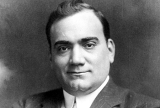A huge archive of Caruso’s personal documents is currently being offered at Christie’s for private sale. It includes 282 letters and telegrams sent by him, and 423 sent to him, dating from across his career. « The tumultuous personal life of the great tenor Enrico Caruso, as dramatic as any opera, is illuminated by a treasure trove of letters and other documents offered for sale », Christie’s says in a news release.
Caruso had two children with the singer Ada Giachetti, before starting a long-term relationship with her sister Rina and ultimately marrying the American heiress Dorothy Park Benjamin in 1918. He died three years later, from pleurisy, aged 48.
Among the documents to be sold are a letter from the singer’s future wife, Dorothy Benjamin, asking if Caruso asked her father for her hand, as well as a telegram from soprano Ada Giachetti. There are also 185 invoices for sale, some of which have remained unpaid for a hundred years.
« These letters tell a gripping story, » says Thomas Venning, head of Books and Manuscripts at Christie’s in London. « They take us inside Caruso’s mind, as he grew from provincial tenor into the world’s most famous singer — as well as bringing us the point of view of those close to him, drawn along by this human whirlwind. He seems to have been on a constant emotional rollercoaster. »
The archive, which also includes a handful of photographs, newspaper cuttings and court papers, was given by the increasingly infirm singer to his friend Antonino Perrone fu Antonio in May 1921. This was shortly before he left the US for the final time, and three months before his death. Perrone, who lived in Boston, was probably chosen as the recipient because he could be trusted with keeping this highly personal archive out of the public eye.
The documents were unknown to Caruso’s 20th-century biographers, including even his own son, Enrico Jr., when writing 1990’s Enrico Caruso: My Father and My Family. They came to light only in 2014, when offered at auction at Christie’s. Now, in the centenary year of Caruso’s death, they come to the market again.
























